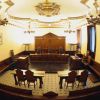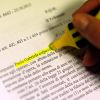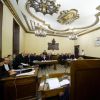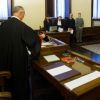Vatican court finds computer tech guilty of aiding, abetting butler
VATICAN CITY (CNS) -- A Vatican court found Claudio Sciarpelletti, a computer expert in the Secretariat of State, guilty of aiding and abetting the papal butler, who was convicted of stealing sensitive Vatican correspondence.
The three-judge panel hearing the case Nov. 10 initially sentenced Sciarpelletti to four months in jail but reduced the sentence to two months, saying Sciarpelletti had never been in trouble with the law and previously had served the Vatican well.
The judges suspended even the two-month sentence and said that if, over the next five years he commits no other crimes, the penalty would be lifted.
The Vatican court indicted Sciarpelletti in August, accusing him of helping Paolo Gabriele, the papal butler, by obstructing the Vatican investigation of the butler's role in stealing, photocopying and leaking private Vatican correspondence to an Italian journalist. The butler is serving an 18-month sentence in a cell in the Vatican police barracks.
After an unnamed source told Vatican investigators in late May that Sciarpelletti and Gabriele were in frequent contact, Vatican police searched Sciarpelletti's office in the Secretariat of State. The police said they found an envelope marked "Personal: P. Gabriele."
The court did not reveal details about the envelope's contents other than mentioning assorted emails signed "Nuvola" (cloud in Italian), a small section of a book written by the Italian journalist who received leaked documents from Gabriele and pages of articles downloaded from the Internet.
Sciarpelletti was arrested in late May and held in a Vatican cell for one night, after which he was released on a bail of 1,000 euros (about $1,270). In its sentence Nov. 10, the court said it would return the bail to Sciarpelletti, but it also ordered him to pay the court costs, which are about the same amount, said Jesuit Father Federico Lombardi, Vatican spokesman.
The Vatican prosecutor accused Sciarpelletti of obstructing the Gabriele investigation by giving different versions of how he obtained the envelope and by changing his descriptions of his relationship with Gabriele.
The court session Nov. 10 began with the testimony of Sciarpelletti. Giuseppe Dalla Torre, president of the three-judge panel, asked the defendant why he changed his story in the month after his arrest.
Sciarpelletti said his arrest was "traumatic," which, combined with the fact that he received the envelope years ago, made it difficult to remember exactly how he came to have it in his desk. He said he did not know what was in the envelope since he never opened it because it was marked "personal."
The computer tech first told investigators that he received the envelope from Gabriele; then he said he received it from his superior, Msgr. Carlo Maria Polvani, head of the Vatican Secretariat of State's office for information and documentation.
Saying, "I swear on my baptism and my priesthood," Msgr. Polvani told the court Nov. 10 that he had never violated the secret of his office and had never improperly removed, copied or shared any confidential Vatican documents. He denied giving Sciarpelletti the envelope.
Msgr. Polvani, the 47-year-old nephew of Archbishop Carlo Maria Vigano, the nuncio to the United States, said he only met Gabriele when the butler came to visit Sciarpelletti in their office, something Msgr. Polvani said he thought happened often. "I think they were good friends," he said.
Gabriele, who also testified Nov. 10, told the court that Sciarpelletti "was a friend and I confided in him," including about "worrying things that were happening in the Vatican." The butler said he gave Sciarpelletti the papers, seeking his opinion about them. But Gabriele said, as far as he remembers, he gave Sciarpelletti the papers on various occasions, so Sciarpelletti must have put the papers in the envelope himself.
Father Lombardi told reporters that Vatican investigators had not closed their files on the "VatiLeaks" scandal; further investigations and even indictments are possible, he said.
The court session Nov. 10 was not without its lighter moments: the court reporter's computer stopped working at a certain point. Sciarpelletti asked, "Do you need a technician?" and everyone in the courtroom burst out laughing. Gianluca Gauzzi Broccoletti, the Vatican police officer who was testifying, got up and discovered that the electrical outlet being used was no longer working. An extension cord was plugged into a different outlet and the testimony resumed.
VATICAN CITY (CNS) -- A second criminal trial opens Nov. 5 in the little courtroom on the ground floor of the Vatican's tribunal building, located just behind the apse of St. Peter's Basilica.
Claudio Sciarpelletti, a computer technician in the Vatican Secretariat of State, is to be tried on charges of aiding and abetting Paolo Gabriele, the papal butler, who was convicted of aggravated theft for stealing or photocopying private Vatican correspondence -- including letters to and from the pope.
The Vatican court's indictment of Sciarpelletti was released Aug. 13 along with the indictment of Gabriele.
The papal butler was arrested May 23 after a police search of his Vatican apartment turned up hundreds of sensitive documents, including many that had been leaked to an Italian journalist. Informed of "continual contacts" between Gabriele and Sciarpelletti, the Vatican court authorized a search May 25 of Sciarpelletti's office in the Secretariat of State, the indictment said.
Sciarpelletti himself led police to their key piece of evidence against him: an envelope in his desk. On the outside of the envelope was written: "Personal: P. Gabriele," the court said. The back of the envelope was marked with the secretariat's seal.
The computer tech was arrested May 25 and held by Vatican security overnight. According to the court documents, his descriptions of his relationship with Gabriele and of the origin and destination of the envelope changed several times over the course of the investigation.
Originally, Sciarpelletti was accused of giving false testimony, conspiracy to commit aggravated theft, aiding and abetting a thief and violating the secrets of his office.
The Vatican court said Sciarpelletti first claimed he knew Gabriele only in passing, but it turned out the two communicated frequently and saw each other -- with their wives and children -- socially as well as at work. He initially said Gabriele gave him the envelope "a couple years ago," asking him to read it and let him know what he thought. The next day, he said that the envelope was given to him by someone identified in the indictment only as "W," and that he was supposed to pass it on to Gabriele.
"The contrasting version of facts furnished by the accused Claudio Sciarpelletti may have hindered the investigation," the indictment said. However, the charges were reduced to "aiding and abetting," which is the closest crime the Vatican has to an accusation of being an accessory after the fact.
The arrest and trial of Gabriele made headlines around the world, and newspapers carried photographs of him on duty before his arrest riding in the front of the popemobile and assisting the pope with his coat. But Sciarpelletti is not known publicly, and Jesuit Father Federico Lombardi, Vatican spokesman, said the Vatican court already has accepted a request from the defense that there be no television cameras or photographers -- not even the Vatican's own -- in the courtroom.
During the Gabriele trial, the three-judge panel hearing the case severely limited any testimony about the contents of the documents Gabriele was accused of stealing and leaking to an Italian journalist. Many of documents that were published concern financial mismanagement, corruption and careerism in the Vatican.
In the indictment, the Vatican court said that among the papers in the envelope Sciarpelletti had was an account titled "Napoleon in the Vatican," which appears in the book published by Gianluigi Nuzzi, the journalist who received documents from Gabriele.
The account focuses on how Domenico Giani, the head of Vatican security, quickly and quietly dealt with an incident in which a vehicle with Vatican license plates was hit by four .22-caliber bullets while parked at a Rome restaurant where Vatican police were eating with colleagues from Interpol. In the end, the incident was attributed to an unknown person with emotional problems who saw the Vatican license plates and started shooting. A restaurant employee who heard the shots reportedly told police he thought they were fireworks.
"Napoleon in the Vatican" also talks about two Vatican police officers and a staff member who reportedly own shares in Italian security firms. Nuzzi says "conflicts of interest" could arise in the future if the Vatican were to ever enter into business with the firms.
Sciarpelletti's attorney already has called Giani and Gianluca Gauzzi Broccoletti, one of the police officers, as witnesses in the trial.
Other witness include: Gabriele himself; Msgr. Carlo Maria Polvani, Sciarpelletti's superior in the Secretariat of State; and Maj. William Kloter, vice commander of the Swiss Guard.
Sciarpelletti spent one night in a Vatican jail cell and then was released on his own recognizance. If found guilty, he is not expected to be sentenced to jail time, although the charge could carry a penalty of up to one year in prison.
Police testify papal butler's apartment crammed with documents
VATICAN CITY - Vatican police officers who searched Paolo Gabriele's apartment testified they found "an infinite amount" of documents and news clippings covering a vast range of topics, including the Masons, the Vatican bank and yoga.
Although they sequestered 82 moving boxes full of materials, once the police inspected all the paper, only a fraction of the material was deemed relevant to the case, officers told a three-judge panel on the third day of the "VatiLeaks" trial.
Vatican judges said they would hear closing arguments Oct. 6; a verdict was possible the same day.
Each of the four police officers testifying Oct. 3 also said they did not wear gloves during the search, saying that was not the usual protocol for conducting a search and seizure of paper.
In the court's brief morning session, the four officers testifying were Stefano De Santis, Silvano Carli, Luca Bassetti and Luca Cintia, vice commissioner of the Vatican police force.
The four men were among the officers who conducted the search of Gabriele's Vatican apartment May 23 and arrested Gabriele that evening. The officers were among eight witnesses all called by the defense to testify in the trial of the former papal assistant, who has been charged with aggravated theft for allegedly stealing and leaking papal correspondence and other sensitive documents.
Gabriele was present in the courtroom during their testimony.
Each officer took the stand while his colleagues waited outside. Each of the officers was asked to describe how the search was conducted, which officers searched which rooms of Gabriele's Vatican apartment and what was found where.
The search started just before 4 p.m. and ended close to midnight. De Santis said he suggested to Gabriele that it would be better for his wife and children, who were home at the time, to leave for awhile because the potentially disturbing event "would be engraved in their memories."
Gabriele declined, and he, his wife and three children stayed in the apartment during the search.Two of the officers were called only later to help with the search. Even while other officers continued to go through Gabriele's home office, the two were asked to check the children's rooms for potential material and to do it quickly so the children could go to bed.
De Santis said the officers also told Gabriele he should phone a lawyer, and he immediately called Carlo Fusco, his childhood friend. Fusco left the defense team in August, saying he and Gabriele had irreconcilable differences of opinion about defense strategy.
The officers said that during the search Gabriele said, "See how much I like to read and study?" But he also apologized that the amount of material in his house "will keep you at work late," and he offered them coffee and water.
Gabriele was taken into police custody around 8 p.m.
In his testimony, De Santis said he realized the seriousness of the alleged crime when they discovered materials matching those leaked to an Italian journalist, who had published them in a book.
"At that point we decided to take away everything" that looked remotely related, and they alerted the head of the Vatican police corps, Domenico Giani.
Highly sensitive materials, including encrypted cables from Vatican nuncios, were "well-hidden" among piles of paper stuffed in cabinets, shelves and ceiling-high closets, he and the other police witnesses said.
Gabriele allegedly leaked a large number of sensitive documents to an Italian journalist who published them in a book early May. De Santis testified that the publication of even one of the coded and deciphered cables could have compromised the Vatican encryption system.
Only a small fraction --"more than 1,000 pages" -- of the materials was determined to be relevant to the case, Carli testified. Some of that material involved information about the private life of the papal household, letters from cardinals to the pope and written replies from the pope. Some documents with the pope's signature were marked in German, "Destroy," two of the officers testified.
The majority of the documents were pages printed off the Internet and news clippings covering a vast array of topics. Gabriele's lawyer, Cristiana Arru, questioned each officer about how much material was found in the apartment and where it had been discovered. In addition to the 82 boxes -- each measuring about 15 inches by 23 inches -- police carried away two black leather suitcases and two "big yellow bags" filled with materials.
Arru told reporters after the hearing that she wanted to show that it was physically impossible for that amount of material to have been in Gabriele's home.
Arru was rebuffed by the main judge, Giuseppe Dalla Torre, when she continued to ask the police whether they were present at the search of Gabriele's quarters at the papal summer residence in Castel Gandolfo. Dalla Torre said repeatedly that the results of the Castel Gandolfo search were not relevant to the case because a Vatican tribunal's jurisdiction only covers crimes committed in Vatican City State.
Police also confiscated one desktop computer, two or three laptops, "many" USB memory pen drives, one iPod, two hard disks and a PlayStation from Gabriele's Vatican apartment, police said. De Santis said police still have not finished examining all of the information on the computers.
Papal butler feels guilt for betraying Pope
VATICAN CITY - Paolo Gabriele, the papal butler charged with stealing and leaking papal correspondence, said he was innocent of charges of aggravated theft, but "I feel guilty for having betrayed the trust the Holy Father placed in me."
"I loved him like a son," Gabriele said of the Pope during the second day of his trial.
The morning session of the trial Oct. 2 also featured brief testimony by Cristina Cernetti, one of the consecrated laywomen who work in the papal apartment; and longer testimony by Msgr. Georg Ganswein, Pope Benedict XVI's personal secretary.
Ganswein, who described himself as "extremely precise," said he never noticed any documents missing, but when he examined what Vatican police had confiscated from Gabriele's Vatican apartment, he discovered both photocopies and originals of documents going back to 2006, when Gabriele began working in the papal apartment.
Taking the stand first, Gabriele said widespread concern about what was happening in the Vatican led him to collect photocopies of private papal correspondence and, eventually, to leak it to a journalist.
"I was looking for a person with whom I could vent about a situation that had become insupportable for many in the Vatican," he testified.
Gabriele told the court that no one encouraged him to steal and leak the documents.
Although he said he acted on his own initiative, Gabriele told the court he did so after "sharing confidences" about the "general atmosphere" in the Vatican with four people in particular: retired Cardinal Paolo Sardi, a former official in the Vatican Secretariat of State; Cardinal Angelo Comastri, archpriest of St. Peter's Basilica; Ingrid Stampa, a longtime assistant to Pope Benedict XVI, going back to his time as Cardinal Joseph Ratzinger; and Bishop Francesco Cavina of Carpi, who worked in the secretariat of state until 2011.
Gabriele said that although he had set aside some documents previously, he began collecting them seriously in 2010 after Archbishop Carlo Maria Vigano, then secretary-general of Vatican City State, was reported to have run into resistance in his attempt to bring spending under control and bring transparency to the process of granting work contracts to outside companies. The archbishop is now nuncio, or ambassador, to the United States.
Asked to describe his role in the papal household, Gabriele said he served Pope Benedict his meals, informed the Vatican Secretariat of State of the gifts given to the Pope, packed the Pope's suitcases and accompanied him on trips, and did other "small tasks" assigned to him by Ganswein.
"I was the layman closest to the Holy Father, there to respond to his immediate needs," Gabriele said.
Being so close to the Pope, Gabriele said he became aware of how "easy it is to manipulate the one who holds decision-making power in his hands."
Gabriele had told investigators that he had acted out of concern for the Pope, who he believed was not being fully informed about the corruption and careerism in the Vatican. Under questioning by his lawyer, he said he never showed any of the documents to the Pope, but tried — conversationally — to bring some concerns to the Pope's attention.
The Vatican prosecutor objected to any further questioning about Gabriele's motives, saying they "don't matter, we must discuss the facts." The judges agreed and ordered the defendant's lawyer to move on.
Gabriele's lawyer also asked him several questions about the 60 days he spent in Vatican detention, including whether or not it was true that he first was held in a tiny room and that, for the first 15-20 days, the Vatican police left the lights on 24 hours a day. Gabriele said both were true.
Jesuit Father Federico Lombardi, Vatican spokesman, later told reporters that Judge Nicola Picardi, the Vatican prosecutor, had opened an investigation into the conditions under which Gabriele was detained.
Vatican investigators had said they found in Gabriele's Vatican apartment three items given to Pope Benedict as gifts: a cheque for 100,000 euros ($123,000 U.S.); a nugget — presumably of gold — from the director of a gold mining company in Peru; and a 16th-century edition of a translation of the Aeneid. Gabriele denied the nugget was ever in his apartment, and he said he had no idea how the cheque got there. As for the book, he said it was normal for him to take home books given to the Pope to show his children.
"I didn't know its value," and, in fact, he carried it around in a plastic bag, he said.
Ganswein testified that he only began suspecting Gabriele in mid-May after a journalist published documents Ganswein knew had never left the office he shared with Gabriele.
When Ganswein entered the courtroom and when he left again, Gabriele stood. He did not do so for the other witnesses.
The trial formally opened Sept. 29 and Vatican judges decided to separate Gabriele's trial on charges of aggravated theft from the trial of Claudio Sciarpelletti, a computer expert in the Vatican Secretariat of State, charged with aiding and abetting Gabriele.
Gabriele was arrested in May after Vatican police found papal correspondence and other items in his Vatican apartment; many of the documents dealt with allegations of corruption, abuse of power and a lack of financial transparency at the Vatican.
The papal valet — who is 46, married and has three children — faces up to four years of jail time, which he would serve in an Italian prison.





